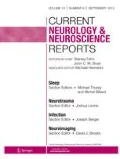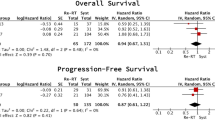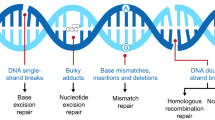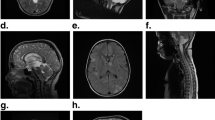Abstract
Temozolomide (TMZ) is an alkylating agent that was approved for anaplastic astrocytoma and glioblastoma. Its role in the treatment of recurrent disease has been confirmed, and more importantly, alternative treatment schedules and combination regimens have been developed. A recent phase III trial has demonstrated a survival advantage for concomitant TMZ administration with radiotherapy in patients with newly diagnosed glioblastoma. Molecular studies suggest a strong predictive role of the DNA repair enzyme O6-methyl-guanine-DNA-methyl-transferase (MGMT) and outcome of TMZbased chemotherapy. This review summarizes the current knowledge, highlights approved and nonapproved indications, and describes molecular studies that may allow us to identify the patients most likely to benefit from this treatment.
Similar content being viewed by others
References and Recommended Reading
Stupp R, Gander M, Leyvraz S, et al.: Current and future developments in the use of temozolomide in the treatment of brain tumors. Lancet Oncol 2001, 2:552–560.
Yung WK, Prados MD, Yaya-Tur R, et al.: Multicenter phase II trial of temozolomide in patients with anaplastic astrocytoma or anaplastic oligoastrocytoma at first relapse. Temodal Brain Tumor Group. J Clin Oncol 1999, 17:2762–2771.
Yung WK, Albright RE, Olson J, et al.: A phase II study of temozolomide vs. procarbazine in patients with glioblastoma multiforme at first relapse. Br J Cancer 2000, 83:588–593.
Brada M, Hoang-Xuang K, Rampling R, et al.: Multicenter phase II trial of temozolomide in patients with glioblastoma multiforme at first relapse. Ann Oncol 2001, 12:259–266.
Chang SM, Theodosopoulos P, Lamborn K, et al.: Temozolomide in the treatment of recurrent malignant glioma. Cancer 2004, 100:605–611.
Stupp R, Mason W, van den Bent M, et al.: Radiotherapy plus concomitant and adjuvant temozolomide for newly diagnosed glioblastoma. N Engl J Med 2005, 352:987–996. This is an important paper on a phase III study establishing the value of adding TMZ chemotherapy to standard radiation and thus defining a new standard of care.
Brock CS, Newlands ES, Wedge SR, et al.: Phase I trial of temozolomide using an extended continuous oral schedule. Cancer Res 1998, 58:4363–4367.
Brada M, Judson I, Beale P, et al.: Phase I dose-escalation and pharmacokinetic study of temozolomide (SCH 52365) for refractory or relapsing malignancies. Br J Cancer 1999, 81:1022–1030.
Ostermann S, Csajka C, Buclin T, et al.: Plasma and cerebrospinal fluid population pharmacokinetics of temozolomide in malignant glioma patients. Clin Cancer Res 2004, 10:3728–3736. This article demonstrates penetration of TMZ into central nervous system and describes pharmacokinetic profile in blood and cerebrospinal fluid.
Gerson SL: MGMT: its role in cancer aetiology and cancer therapeutics. Nat Rev Cancer 2004, 4:296–307. This is an excellent review of the role of the DNA repair enzyme MGMT.
Gerson SL: Clinical relevance of MGMT in the treatment of cancer. J Clin Oncol 2002, 20:2388–2399.
Belanich M, Randall T, Pastor MA, et al.: Intracellular Localization and intercellular heterogeneity of the human DNA repair protein O(6)-methylguanine-DNA methyltransferase. Cancer Chemother Pharmacol 1996, 37:547–555.
Jaeckle KA, Eyre HJ, Townsend JJ, et al.: Correlation of tumor O6 methylguanine-DNA methyltransferase levels with survival of malignant astrocytoma patients treated with bis-chloroethylnitrosourea: a Southwest Oncology Group study. J Clin Oncol 1998, 16:3310–3315.
Friedman H, McLendon R, Kerby T, et al.: DNA mismatch repair and O6-aklylgunaine-DNA alkyltransferase analysis and response to temodal in newly diagnosed malignant glioma. J Clin Oncol 1998, 16:3851–3857.
Silber JR, Blank A, Bobola MS, et al.: O6-methylguanine-DNA methyltransferase-deficient phenotype in human gliomas: frequency and time to tumor progression after alkylating agent-based chemotherapy. Clin Cancer Res 1999, 5:807–814.
Tolcher AW, Gerson SL, Denis L, et al.: Marked inactivation of O6-alkylguanine-DNA alkyltransferase activity with protracted temozolomide schedules. Br J Cancer 2003, 88:1004–1011. This paper demonstrates the continuous depletion of MGMT in peripheral blood mononuclear cells associated with different schedules of TMZ administration. It has a summary of phase I results of TMZ treatment 7-days on and 7-days off for 3 weeks out of 4.
Vera K, Djafari L, Faivre S, et al.: Dose-dense regimen of temozolomide given every other week in patients with primary central nervous system tumors. Ann Oncol 2004, 15:161–171.
Spiro TP, Liu L, Majka S, et al.: Temozolomide: the effect of once- and twice-a-day dosing on tumor tissue levels of the DNA repair protein O(6)-alkylguanine-DNA-alkyltransferase. Clin Cancer Res 2001, 7:2309–2317.
Khan RB, Raizer JJ, Malkin MG, et al.: A phase II study of extended low-dose temozolomide in recurrent malignant gliomas. Neuro-oncology 2002, 4:39–43.
Hughes MA, Kleinberg L, Parisi M, et al.: Low CD4 counts and PCP prophylaxis in patients with primary brain tumors treated with steroids and radiation. Int J Radiat Oncol Biol Phys 2003, 57:S369-S370.
Mahindra AK, Grossman SA: Pneumocystis carinii pneumonia in HIV negative patients with primary brain tumors. J Neurooncol 2003, 63:263–270.
Stupp R, Dietrich P, Ostermann Kraljevic S, et al.: Promising survival for patients with newly diagnosed glioblastoma multiforme treated with concomitant radiation plus temozolomide followed by adjuvant temozolomide. J Clin Oncol 2002, 20:1375–1382. This is a pilot study describing concomitant and adjuvant TMZ therapy in glioblastoma. It describes toxicity, surveillance, and supportive measures.
Su YB, Sohn S, Krown SE, et al.: Selective CD4+ lymphopenia in melanoma patients treated with temozolomide: a toxicity with therapeutic implications. J Clin Oncol 2004, 22:610–616. This is an important paper drawing attention to unusual toxicity of continuous administration of TMZ (eg, lymphocytopenia, opportunistic infections, Kaposi sarcoma).
Kovacs JA, Masur H: Prophylaxis against opportunistic infections in patients with human immunodeficiency virus infection. N Engl J Med 2000, 342:1416–1429.
Macdonald DR, Cascino TL, Schold SC Jr, et al.: Response criteria for phase II studies of supratentorial malignant glioma. J Clin Oncol 1990, 8:1277–1280.
Wong ET, Hess KR, Gleason MJ, et al.: Outcomes and prognostic factors in recurrent glioma patients enrolled onto phase II clinical trials. J Clin Oncol 1999, 17:2572.
Wick W, Steinbach JP, Kuker WM, et al.: One week on/one week off: a novel active regimen of temozolomide for recurrent glioblastoma. Neurology 2004, 62:2113–2115.
van den Bent MJ, Taphoorn MJ, Brandes AA, et al.: Phase II study of first-line chemotherapy with temozolomide in recurrent oligodendroglial tumors: the European Organization for Research and Treatment of Cancer Brain Tumor Group Study 26971. J Clin Oncol 2003, 21:2525–2528. This paper details the results of cooperative group research showing the value of TMZ chemotherapy as first-line chemotherapy in patients with recurrent anaplastic oligodendroglioma and mixed oligoastrocytoma.
van den Bent MJ, Keime-Guibert F, Brandes AA, et al.: Temozolomide chemotherapy in recurrent oligodendroglioma. Neurology 2001, 57:340–342.
Chinot O Jr, Honore S, Barrie M Jr, et al.: Safety and efficacy of temozolomide in patients with recurrent anaplastic oligodendrogliomas after standard radiotherapy and chemotherapy. J Clin Oncol 2001, 19:2449–2455.
van den Bent MJ, Chinot O, Boogerd W, et al.: Second-line chemotherapy with temozolomide in recurrent oligodendroglioma after PCV (procarbazine, lomustine and vincristine) chemotherapy: EORTC Brain Tumor Group phase II study 26972. Ann Oncol 2003, 14:599–602.
Triebels VH, Taphoorn MJ, Brandes AA, et al.: Salvage PCV chemotherapy for temozolomide-resistant oligodendrogliomas. Neurology 2004, 63:904–906.
Cairncross JG, Ueki K, Zlatescu MC, et al.: Specific genetic predictors of chemotherapeutic response and survival in patients with anaplastic oligodendrogliomas. J Natl Cancer Inst 1998, 90:1473–1479.
Bauman GS, Ino Y, Ueki K, et al.: Allelic loss of chromosome 1p and radiotherapy plus chemotherapy in patients with oligodendrogliomas. Int J Radiat Oncol Biol Phys 2000, 48:825–830.
Biemond-ter Stege EM, Kros JM, de Bruin HG et al.: Successful treatment of low-grade oligodendroglial tumors with a chemotherapy regimen of procarbazine, lomustine, and vincristine. Cancer 2005, 103:802–809.
Sanson M, Cartalat-Carel S, Taillibert S, et al.: Initial chemotherapy in gliomatosis cerebri. Neurology 2004, 63:270–275. This is a summary of French experience of treating gliomatosis with TMZ or with PCV chemotherapy.
Gilbert MR, Friedman HS, Kuttesch JF, et al.: A phase II study of temozolomide in patients with newly diagnosed supratentorial malignant glioma before radiation therapy. Neuro-oncology 2002, 4:261–267.
Friedman HS, Kokkinakis DM, Pluda J, et al.: Phase I trial of O6-benzylguanine for patients undergoing surgery for malignant glioma. J Clin Oncol 1998, 16:3570–3575.
Barrie M, Couprie C, Dufour H, et al.: Preradiation combination of temozolomide (TMZ) and BCNU as primary treatment before radiotherapy (RT) in inoperable newly diagnosed glioblastoma multiforme. Ann Oncol 2005, In press. This trial suggests a potential value for combining TMZ and BCNU despite an increase in toxicity.
Chang SM, Prados MD, Yung WK, et al.: Phase II study of neoadjuvant 1, 3-bis (2-chloroethyl)-1-nitrosourea and temozolomide for newly diagnosed anaplastic glioma: a North American Brain Tumor Consortium Trial. Cancer 2004, 100:1712–1726.
Chinot OL, Barrie M, Frauger E, et al.: Phase II study of temozolomide without radiotherapy in newly diagnosed glioblastoma multiforme in an elderly populations. Cancer 2004, 100:2208–2214.
Roa W, Brasher PM, Bauman G, et al.: Abbreviated course of radiation therapy in older patients with glioblastoma multiforme: a prospective randomized clinical trial. J Clin Oncol 2004, 22:1583–1588.
Walker MD, Alexander E Jr, Hunt WE, et al.: Evaluation of BCNU and/or radiotherapy in the treatment of anaplastic gliomas. A cooperative clinical trial. J Neurosurg 1978, 49:333–343.
Raizer JJ, Malkin MG, Kleber M, et al.: Phase 1 study of 28-day, low-dose temozolomide and BCNU in the treatment of malignant gliomas after radiation therapy. Neuro-oncology 2004, 6:247–252.
Brandes AA, Basso U, Reni M, et al.: First-line chemotherapy with cisplatin plus fractionated temozolomide in recurrent glioblastoma multiforme: a phase II study of the Gruppo Italiano Cooperativo di Neuro-Oncologia. J Clin Oncol 2004, 22:1598–1604.
Stupp R, Hegi ME: Recent developments in the management of malignant glioma. In ASCO 2003 Educational Book. Edited by Perry M. Alexandria, VA: American Society of Clinical Oncology; 2003:779–788.
Friedman HS, Petros WP, Friedman AH, et al.: Irinotecan therapy in adults with recurrent or progressive malignant glioma. J Clin Oncol 1999, 17:1516–1525.
Brandes AA, Tosoni A, Basso U, et al.: Second-line chemotherapy with irinotecan plus carmustine in glioblastoma recurrent or progressive after first-line temozolomide chemotherapy: a phase II study of the Gruppo Italiano Cooperativo di Neuro-Oncologia (GICNO). J Clin Oncol 2004, 22:4727–4734.
Stupp R, Ostermann S, Calderoni A, et al.: Temozolomide and irinotecan (CPT-11) for for primary brain tumors. A dose escalation study. Proc Am Soc Clin Oncol 2003, 22:22[abstract #415].
Wagner LM, Crews KR, Iacono LC, et al.: Phase I trial of temozolomide and protracted irinotecan in pediatric patients with refractory solid tumors. Clin Cancer Res 2004, 10:840–848.
Jones SF, Gian VG, Greco FA, et al.: Phase I Trial of irinotecan and temozolomide in patients with solid tumors. Oncology (Huntingt) 2003, 17:41–45.
Levin V, Phuphanich S, Glantz M, et al.: Randomized phase II study of temozolomide (TMZ) with and without the matrix metalloprotease (MMP) inhibitor prinomastat in patients (pts) with glioblastoma multiforme (GBM) following best surgery and radiation therapy. Proc Am Soc Clin Oncol 2002, 21:26a[abstract #100].
Groves MD, Puduvalli VK, Hess KR, et al.: Phase II trial of temozolomide plus the matrix metalloproteinase inhibitor, marimastat, in recurrent and progressive glioblastoma multiforme. J Clin Oncol 2002, 20:1383–1388.
Chang SM, Lamborn KR, Malec M, et al.: Phase II study of temozolomide and thalidomide with radiation therapy for newly diagnosed glioblastoma multiforme. Int J Radiat Oncol Biol Phys 2004, 60:353–357.
Jaeckle KA, Hess KR, Yung WK, et al.: Phase II evaluation of temozolomide and 13-cis-retinoic acid for the treatment of recurrent and progressive malignant glioma: a North American Brain Tumor Consortium study. J Clin Oncol 2003, 21:2305–2311.
Gilbert MR, Hess K, Gaupp P, et al.: A phase I study of temozolomide and the farnesyltransferase inhibitor, tipifarnib in recurrent glioblastoma: a dose and schedule intensive regimen. Neuro-Oncology 2004, 6:375(abstract TA-23).
Quinn JA, Reardon DA, Friedman AH, et al.: Phase II trial of temozolomide in patients with progressive low-grade glioma. J Clin Oncol 2003, 21:646–651.
Pace A, Vidiri A, Galiè E, et al.: Temozolomide chemotherapy for progressive low-grade glioma: clinical benefits and radiological response. Ann Oncol 2003, 14:1722–1726.
Stupp R, Baumert BG: Promises and controversies in the management of low-grade glioma. Ann Oncol 2003, 14:1695–1696.
Brada M, Vivers L, Abson C, et al.: Phase II study of primary temozolomide chemotherapy in patients with WHO grade II gliomas. Ann Oncol 2003, 14:1715–1721. This trial in a homogeneous patient population explores the response rate of TMZ as first-line treatment in patients with low-grade glioma. It shows that despite modest objective response rates, a clinical benefit can be derived for at least half of patients.
Hoang-Xuan K, Capelle L, Kujas M, et al.: Temozolomide as initial treatment for adults with low-grade oligodendrogliomas or oligoastrocytomas and correlation with chromosome 1p deletions. J Clin Oncol 2004, 22:3133–3138. This is a prospective trial demonstrating a correlation of 1p LOH and response to TMZ chemotherapy. This trial also shows that maximum tumor response may be observed as late as 12 months.
Buckner JC, Gesme D Jr, O’Fallon JR, et al.: Phase II trial of procarbazine, lomustine, and vincristine as initial therapy for patients with low-grade oligodendroglioma or oligoastrocytoma: efficacy and associations with chromosomal abnormalities. J Clin Oncol 2003, 21:251–255.
Cairncross J, Seiferheld W, Shaw E, et al.: An intergroup randomized controlled clinical trial (RCT) of chemotherapy plus radiation (RT) versus RT alone for pure and mixed anaplastic oligodendrogliomas: initial report of RTOG 94-02. J Clin Oncol Annual Meeting Proceedings (Post-Meeting Edition) 2004, 22:[abstract #1500].
Esteller M, Garcia-Foncillas J, Andion E, et al.: Inactivation of the DNA-repair gene MGMT and the clinical response of gliomas to alkylating agents. N Engl J Med 2000, 343:1350–1354. This is an important study showing retrospectively the association of MGMT gene promoter silencing and outcome in malignant glioma patients treated with nitrosourea chemotherapy.
Hegi ME, Diserens AC, Godard S, et al.: Clinical trial substantiates the predictive value of O-6-methylguanine-DNA methyltransferase promoter methylation in glioblastoma patients treated with temozolomide. Clin Cancer Res 2004, 10:1871–1874.
Hegi M, Diserens A, Gorlia T, et al.: MGMT gene silencing and benefit from Temozolomide chemotherapy and MGMT gene silencing in Glioblastoma. N Engl J Med 2005, 352:997–1003. This is a unique paper demonstrating in patients treated within a randomized trial that MGMT is truly a predictive marker of benefit from TMZ chemotherapy rather than only a prognostic factor.
Author information
Authors and Affiliations
Rights and permissions
About this article
Cite this article
Stupp, R., van den Bent, M.J. & Hegi, M.E. Optimal role of temozolomide in the treatment of malignant gliomas. Curr Neurol Neurosci Rep 5, 198–206 (2005). https://doi.org/10.1007/s11910-005-0047-7
Issue Date:
DOI: https://doi.org/10.1007/s11910-005-0047-7




